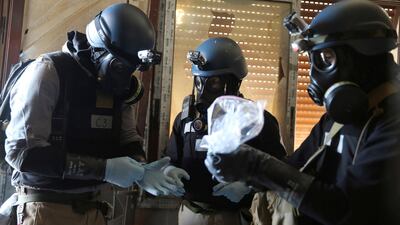There have been at least six documented chemical attacks in Ghouta and Idlib province by the Syrian regime in the past two weeks. These have predominantly been chlorine, dropped as barrel bombs or fired in rockets, although the attack on Saraqeb in February appears to be the deadly nerve agent Sarin and allegedly killed three children.
As we approach the seventh year of this shockingly violent conflict, the Syrian war has become synonymous with two distinct and irrefutable crimes against humanity: the use of chemical weapons and the direct targeting of hospitals and medical personnel. In this period there have been more than 1,000 documented uses of chemical weapons by the regime and ISIL. The UN's inspectors, the Organisation for the Prohibition of Chemical Weapons, have been called to investigate some attacks, but the Russians have vetoed their activities on 10 occasions to date. I have also investigated a number of attacks and in 2014 published the results of our investigation into the attacks on Kafr Zita and Talemenes a few days before in the Daily Telegraph.
This unequivocally showed chlorine was used and the regime was responsible. With the same information, the OPCW agreed with this assertion six months later. Surely this cannot be the best we can do, especially given the real-time news available across social media?
The OPCW is a Nobel prize winner and a well-deserved one, but its procedures are out of kilter with fast-moving conflicts and terror attacks. An urgent review is required, so that it can produce timely results, which the UN can act on to prevent further atrocities and proliferation. Notwithstanding the fact that Russia is likely to veto any changes, the other permanent members of the UN Security Council and the influential GCC countries must act to ensure this review happens.
Emmanuel Macron stated earlier this year that France would strike Syria if there was evidence of chemical usage. At least one western security service is sure Bashar Al Assad is still using Sarin. However, there is a worrying suggestion that some now do not see chlorine and other toxic materials as chemical weapons – perhaps this is the reason for inaction in the face of clear and multiple uses of chlorine? The Geneva Convention and the Chemical Weapons Convention are clear that it is illegal to use any toxic substance to kill or injure people. This promise of action by world leaders, which has not hitherto been followed through, except by Donald Trump's strike in April last year, has ultimately led to the 100-year taboo on the use of chemical weapons being broken and the possibility of every despot, dictator, rogue state or terrorist using them in future – with impunity.
Though Russia continues to deny the use of chemical weapons in Syria and has actively prevented the UN investigating such allegations, I do not believe they are directly involved in the use in Syria, but must be aware of it. The Syrian jets that dropped the nerve agent on Khan Sheikhoun last year, took off from an air base where Russian military are stationed. Even the most casual observer would have noticed gas-masked soldiers loading these bombs?
In the new Cold War with Russia and global instability in the Middle East fuelled by Syria and Iran, Nato and the GCC must be prepared for chemical weapons usage. Though Russia and the US have destroyed their chemical stocks, they still maintain the capability to produce new ones and there is speculation that research has been done on new super chemicals many times more potent than nerve agents. All have seen how effective chemical weapons have been in Syria and Iraq, especially in fighting in built up areas, and if there is conflict between East and West we must now assume, that chemical weapons will be used.
This being the case, quite apart from the very real threat of terrorist use, Nato and GCC countries need to reinvest in their chemical defence capabilities and be prepared to fight in this "dirty" environment.

